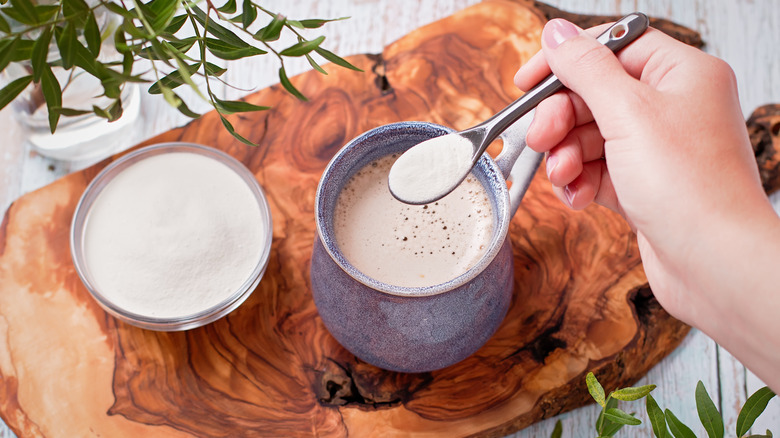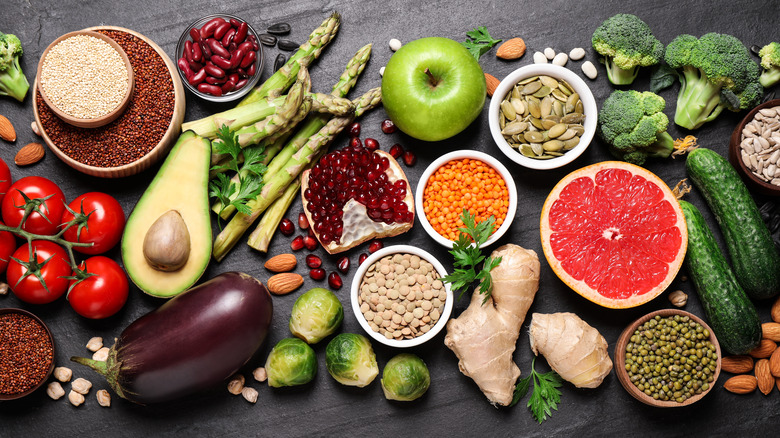The Truth About The Collagen Diet
You may have heard of the skin-beautifying effects of collagen. This protein is found in various parts of your body, from your muscles and skin to your bones and tendons, notes Dr. Axe. Rich in amino acids, it's said to play a key role in keeping our skin vibrant, supple, and most importantly, healthy.
Collagen production is at its highest when we're younger, according to a study review published in International Food Research Journal. It decreases as we age, with collagen levels in the body gradually plummeting. It's one of the reasons why a person's skin starts to develop wrinkles over time and generally lose some of its fullness (per Healthline).
A loss of collagen is a natural part of getting older and can't be stopped. However, a researchers suggest it's possible to elevate your collagen levels by adopting a collagen diet (via MedicineNet). While it's not quite the answer to the fountain of youth, it can help boost collagen in your body and bring some vitality to your skin, hair, nails, and joints. It also helps to prevent a loss of bone density and may even improve the bacterial composition of your gut. On the other hand, an excess of collagen could veer towards being harmful, so it's important not to overdo it.
So, what exactly is the collagen diet?
The collagen diet is an eating plan that's aimed at helping your body increase its natural collagen production, according to MedicineNet. It's made up of collagen-rich and collagen-boosting foods. Adding collagen-promoting foods to your diet can help your body create certain amino acids that lay the foundation for healthy skin (via Dr. Axe). The key players in collagen synthesis include proline and glycine.
Bone broth is one of the most well-known food sources of collagen, per Naked Nutrition. It offers a highly bioavailable form of collagen in that it's immediately absorbed and used by the body. It also contains glycine, which is vital for collagen production. But there's been some debate as to how healthy and safe to eat bone broth actually is. Some studies have discovered toxic metals like lead in broth that's made from chicken bones, according to the Harvard T.H. Chan School of Public Health.
International Food Research Journal cites fish as another high-collagen food, since it has bones and ligaments that are made up of collagen. Some researchers claim that fish is one of the most bioavailable sources of collagen, making it more potent than plant-based anti-aging supplements, according to a study published in Oxidative Medicine and Cellular Longevity. Eggs also have a high concentration of the collagen-building amino acid proline (via Naked Nutrition).
Can the collagen diet be vegan-friendly?
Collagen is often extracted from the skin, bones, tendons, and ligaments of animals, such as chickens, ducks, and fish, according to International Food Research Journal. However, there are tons of plant-based foods that are high in the amino acids that form collagen, notes Healthline, including beans, tofu, nuts, seeds, and many other legumes. In fact, while animal skin and bones are collagen-rich and the primary source of collagen in many supplements, animal meat is relatively low in glycine and proline –- the main building blocks of collagen (via Dr. Axe).
Eating fruits and vegetables is generally a great way to help boost collagen production and improve skin health, according to research published in the journal Dermato-Endocrinology. It's also fairly inexpensive and environmentally friendly. Another vegan-friendly option is spirulina, which is a form of blue-green algae that contains glycine and can be added to smoothies, juices, and various dishes (via Dr. Axe).
A number of collagen-like proteins have also been found in yeast and bacteria. This has led scientists to genetically engineer collagen from yeast strains like P. pastoris (via Advanced Drug Delivery Reviews).
Some of the benefits of the collagen diet
Collagen contributes to the better functioning of various parts of the body. The International Food Research Journal notes that as we get older, collagen synthesis diminishes and our bodies gradually stop producing as much collagen as before, causing our tissues to grow weaker and thinner. Since collagen levels decline with age, increasing the amount of collagen in your diet may help strengthen and support the body's organs and processes. In particular, it's been lauded for improving the condition of your skin, nails, and body tissues.
Collagen is most famous for its age-defying properties. A 2019 study published in Nutrients points out that many different factors can weaken your skin and make it less elastic, including smoking, sunlight, too much alcohol, pollution, and a lack of nutrients. Collagen degradation due to aging is another big contributor. Increasing your collagen levels is believed to improve the moisture, texture, and elasticity of your skin. It's said to help reduce the appearance of lines and wrinkles and prevent your skin from becoming dry and dehydrated.
Taking collagen supplements may also treat or reduce the risk of osteoporosis, according to a 2000 study published in Seminars in Arthritis and Rheumatism. Cleveland Clinic notes that our bones are made primarily of collagen, so when natural collagen synthesis slows down and our body stops producing it, our bones weaken and become more fragile, with fractures becoming more common.
What's the deal with collagen supplements?
A collagen diet can sometimes include taking collagen supplements (via MedicineNet). Most of these are hydrolyzed, which means that they're broken down to make them easier for the body to absorb. Collagen supplements usually come in the form of tablets, powders, or capsules. Collagen is even sometimes infused into drinks.
According to a review study published in the Journal of Drugs in Dermatology, collagen-based dietary supplements have been shown to have both short and long-term benefits for skin aging and the healing of wounds. People who took them over a 4- to 12-week period reported improvements in skin hydration and elasticity. However, experts generally agree that more research is needed to determine proper dosage.
Collagen supplements are usually made out of the connective tissues, bones, and skin of animals (via MedicineNet). But researchers have found that collagen supplementation derived from animal by-products can sometimes contain viruses and toxic substances that are harmful to your health. So, it's important to look into any supplements you might purchase. There are vegan supplements, on the other hand, that contain the amino acids involved in collagen synthesis. These can help raise the levels of collagen in your body. Supplements that are cultivated in a lab from bacteria are also usually animal-free (though be sure to check the label). MedicineNet notes that collagen supplements can be harmful when consumed in the wrong dosage, so be careful not to take too much.
Other foods that can help induce collagen production
There are other ways to promote collagen production in your body. For instance, vitamin C plays an important role in the conversion of proline into collagen, according to a 2017 study published in Nutrients. In other words, foods that are high in vitamin C indirectly facilitate the production of collagen. People adopting a collagen diet can benefit from adding lots of fruits and vegetables to their plate, as many promote the production of collagen (via Dr. Axe). These foods include citrus fruits, berries, pumpkin seeds, garlic, and leafy green vegetables like kale, spinach, and arugula.
Along with vitamin C, other nutrients that increase the synthesis of collagen are zinc and copper, per Cleveland Clinic. Foods you may want to add to your next shopping list include beans, nuts, peppers, tomatoes, broccoli, and whole grains –- as well as seafood and animal meat for non-vegans.
The collagen diet isn't just about what you eat, but also extends to what you avoid putting into your body. MedicineNet notes that the diet guides eaters towards lowering their consumption of foods that can play havoc with their collagen levels, such as sugar and refined carbohydrates.






